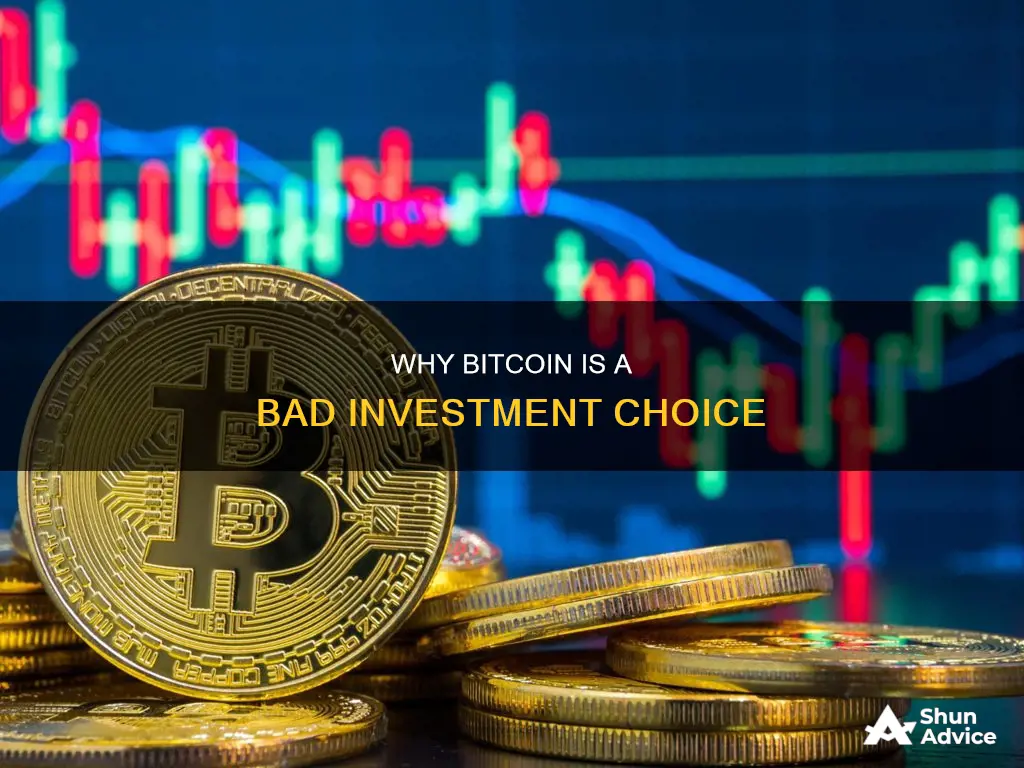
Bitcoin is a risky investment. While it has offered the potential for high returns, it is a volatile asset with a short track record, making it difficult to predict its future. It is also unregulated, with no consumer protection, and transactions are irreversible. There is also no tangible way to value Bitcoin, and it is not a legal tender. As such, investors could be left vulnerable in the case of defaults, and there is a risk of extreme volatility and cyber attacks.
| Characteristics | Values |
|---|---|
| High-interest debt | Not a good investment option if you have high-interest debt |
| Day trading | Not easier compared to other assets |
| Fad | Not a good investment option if you are following a fad |
| FOMO | Not a good investment option if you have FOMO |
| Quick money | Not a good investment option if you are looking for quick money |
| Speculation | Not a real investment, just speculation |
| Emergency cash fund | Not a good investment option if you don't have an emergency cash fund |
| Loss-averse | Not a good investment option if you are trying to make back what you lost |
| Volatile and fluctuating market | Constantly changing price, unpredictable market |
| Technology reliance | Reliant on technology, vulnerable to cyberthreats |
| Little or no regulation | Operating without any major regulations |
What You'll Learn

Bitcoin is hard to value
Bitcoin is not backed by a central authority, like a government-sanctioned medium of exchange, which would improve faith in its value. Instead, its value is influenced by factors such as availability on exchanges, supply and demand, and the monetary policy of each cryptocurrency. For example, Bitcoin has a fixed maximum supply of 21 million digital coins, which is known and influences its value.
The value of Bitcoin is also impacted by broader adoption and increased demand from institutional investors. For instance, when institutional investors started buying and holding Bitcoin in early 2021, the price increased significantly as demand outstripped the pace of new coin creation.
Bitcoin is also highly volatile, making it difficult to value. Veteran economist David Rosenberg compares buying Bitcoin to gambling, stating that it is much easier to value stocks, bonds, cash, and commodities than cryptocurrencies. He argues that these traditional assets have intrinsic value, whereas Bitcoin does not yield a return for investors and is subject to high levels of volatility.
Altcoin Investing Guide for Indians: Getting Started
You may want to see also

It's more speculation than investing
Investing in Bitcoin is more speculation than investing. This is because, fundamentally, Bitcoin is not an investment. It does not have any intrinsic value, and it does not produce anything or generate cash flow. Instead, it is a speculative asset, and its price depends on supply and demand dynamics in the marketplace. In other words, when you buy Bitcoin, you are hoping that someone else will pay more for it in the future. This is a form of gambling, and it is very different from investing in a business or a rentable piece of real estate, which are investments that have intrinsic value and generate cash flow.
Speculating in Bitcoin is a high-risk activity, as there is a high probability of losing money. The price of Bitcoin is extremely volatile and subject to wide fluctuations. It is also difficult to time the market correctly, and even professional traders often get it wrong. As such, treating cryptocurrency investing as a get-rich-quick scheme is essentially gambling.
Another key difference between investing and speculating is the time horizon. Investors are typically in it for the long haul, while speculators aim to make money off short-term market fluctuations. This short-term focus is evident in the Bitcoin market, where traders buy and sell the asset in the hope of profiting from short-term price changes.
Additionally, the value of Bitcoin is based on the speculative notion of "limited supply equals value". The idea that restricting the supply of Bitcoin will increase its value is flawed. Scarcity does not necessarily equate to value. Furthermore, there are numerous other cryptocurrencies available, diluting the price of each.
In conclusion, investing in Bitcoin is more speculation than investing due to its high risk, volatile nature, short-term focus, and flawed value proposition. It is important for individuals to understand the differences between investing and speculating and to approach Bitcoin with caution, treating it as a speculative asset rather than a traditional investment.
Should You Invest in Bitcoin?
You may want to see also

It presents serious risks
Investing in Bitcoin presents serious risks. Firstly, the cryptocurrency market is volatile and fluctuating, making it unpredictable and leaving investors vulnerable to massive losses. The price of Bitcoin is constantly changing, and with such erratic movement, there is no guarantee of a return on investment.
Secondly, Bitcoin is a technology-reliant asset, and as such, it is susceptible to cyberattacks and hacking. The lack of security creates a significant risk for investors, as there is no way to retrieve lost or stolen Bitcoins. Many reports indicate that buyers often lose their investments on exchanges and through mining losses. Exchanges are particularly vulnerable to hacking, and even those with smart wallets are not immune. Additionally, if an investor loses or misplaces their wallet key, their coins are often irretrievable.
Thirdly, the Bitcoin market currently operates with little to no regulation. The lack of government intervention and taxation makes it an enticing prospect for investors. However, this absence of oversight could lead to problems if Bitcoin were to become a competitor to government-issued currency. The future of the Bitcoin market is uncertain, and its status as a widely accepted currency is not guaranteed.
Finally, Bitcoin is a speculative asset, and its value is based solely on supply and demand dynamics. The price of a Bitcoin increases when demand is high and there is a limited supply available. This speculative nature of Bitcoin means that its future value is entirely dependent on what others are willing to pay for it, rather than any fundamental or intrinsic worth.
Institutional Bitcoin Adoption: Who's In and Why?
You may want to see also

There's a short track record
Bitcoin has a short investment history, and in its short existence, its price has been extremely volatile. It was introduced to the public in 2009 and has since become the most well-known and largest cryptocurrency in the world. Its popularity has inspired the development of many other cryptocurrencies.
Bitcoin's price is renowned for being highly volatile. In 2022, its price crashed, dropping from a high of about $69,000 in November 2021 to $15,731 in November 2022. It then recovered in 2023, climbing to a price of $31,474 before dropping back below $30,000. In early 2024, bitcoin's price jumped into the mid $40,000s and, by mid-February 2024, it had climbed to more than $50,000. Bitcoin's all-time high price is $73,794, reached on March 14, 2024.
Bitcoin's price movements are prone to volatility and it is greatly influenced by news events. For example, in May 2021, Tesla CEO Elon Musk announced that Tesla would no longer accept Bitcoin as payment due to concerns about its environmental impact, causing a drop in its price.
Bitcoin's short track record and price volatility make it a high-risk investment. Its price movements have been so drastic that many people purchase Bitcoin for its investment value rather than its ability to act as a medium of exchange.
As with any investment, particularly one as new and volatile as Bitcoin, investors should carefully consider if Bitcoin is the right investment for them.
Which Crypto Coins Are Attracting Institutional Investors?
You may want to see also

It's not a legal tender
Bitcoin is not a legal tender in most parts of the world. While it is legal to use in many countries, it is not recognised as an official currency.
In the US, for example, the Internal Revenue Service (IRS) considers bitcoin and other cryptocurrencies property and has issued guidelines for taxpayers. The IRS categorises bitcoin as property for taxation purposes, meaning that capital gains and losses must be reported. This is the case in many countries where bitcoin is legal, including the UK, Canada, and Australia.
The International Monetary Fund (IMF) has advised its member countries against granting legal tender status to cryptocurrencies, citing the need to safeguard monetary sovereignty and stability. The IMF also notes that adopting crypto as legal tender could expose governments to foreign exchange rate risk and affect their social policy objectives.
Some countries have taken a particularly hard stance against bitcoin. India, for instance, has banned banks from dealing in bitcoin and left the overall legal status of cryptocurrencies unclear. China has also heavily restricted bitcoin, although it has licensed certain exchanges to offer bitcoin and ether trading.
While bitcoin is not a legal tender, it is still used as a currency in some places. Japan, for example, is one country where bitcoin is widely used to make payments for goods and services. However, the lack of legal tender status means that bitcoin users cannot rely on the same protections as those using traditional currencies.
Bitcoin Investments: Are They Still Worthwhile?
You may want to see also
Frequently asked questions
Bitcoin is a highly volatile and unpredictable market, with no physical collateral, making it a highly speculative investment.
Bitcoin is a technology-based currency that is susceptible to cyberattacks and fraud. The lack of government regulation and taxation also creates uncertainty about its future as a legitimate currency.
Instead of investing in Bitcoin, consider investing in assets that will generate income, such as real estate, stocks, or bonds.







